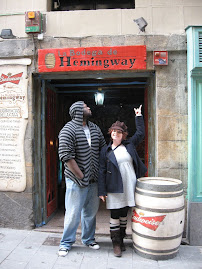I've been reading Stephen P. Hinshaw's
The Mark of Shame: Stigma of Mental Illness and an Agenda for Change over the past couple days (damn, Interlibrary Loan gave me a whole 7 days to read the book and get it back to them--needless to say, I have $4 in fines waiting for me tomorrow). So, I'm going to post some important quotations to help me for future reference/discussion. Oh, and I'm working on my abstract for the Autism panel this week and I'll post it here when it's done. I'm pretty much going to beg the chair to let me be on the panel, even if I have to wash his car or something. Whatever it takes.
"Currently, homelessness is fueled by a mental health system that fails to provide even rudimentary care for those formerly housed in institutions. A third or more of the homeless population suffers from severe mental illness, and a lack of systematic care plagues people with mental disorders even if they do find shelter. Isolated in inner-city settings, many current 'community' residences rival earlier institutions as sources of despair and even premature death" (Hinshaw xiii).
"Jails and prisons have become the largest mental facilities in the United States, fueled by the increasing tendency to criminalize mental illness and the closure of most public mental hospitals. Psychological and psychiatric care is woefully inadequate in prisons, and exposure to violent conditions can only worsen the prognosis. Training of police and law enforcement is almost nonexistent" (Hinshaw xiii).
[I see these points important particularly as it relates to the representation of autistic adults in society. One common topic of contention amongst "vaccines cause autism" proponents is that "we" don't see adult autistics walking around in our society. Because we don't see autistic adults like we do autistic children today, autism is a late 20th century-early 21st century phenomena due to vaccination reactions. I argue, however, that perhaps we don't "see" autistic adults because those profoundly autistic are more likely to make up invisible sectors of our society. The homeless, prisoners, immigrants, "mentally retarded."]"Media portrayals of people with mental disorder continue to feature stereotypes and ridicule, equating mental disorder with incompetence and violence" (Hinshaw xiii).
"In the United States, knowledge of mental illness has improved over the past decades, but stigmatization of the most severe forms of mental disorder has actually increased" (Hinshaw xiii).
For purposes of time and space, I'll just note that Hinshaw provides a thorough definition of "mental disorder" as it relates to stigma based on social, moral, and medical models.
"...aberrant behavior cannot be considered as mentally disordered unless it explicitly violates social norms or induces substantial impairment to the individual in question. That is, the first component of the definition involves
harm. As with all definitions incorporating such socially normative perspectives, this component is culturally relative: What might be considered harmful or impairing in one society or culture may not be in another. The point is that social and personal judgments are a
necessary component of defining behavior patterns as mentally disordered" (emphasis not mine, Hinshaw 15).
"Yet, this criterion alone is far too relative to constitute a viable definition. Indeed, designations of harm could easily constitute cases of social deviance per se, without the presence of a deeper level of medical or neural problem. The behavior patter in question must also be
dysfunctional in an evolutionary sense to qualify as a mental disorder. In other words, there must be an aberration in a naturally selected mental mechanism that is not working as intended (in other words, as naturally selected)" (emphasis not mine, Hinshaw 15).
"If we are not positive as to the nature of functional minds and mental mechanisms, how can we know what is inherently
dysfunctional?" (Hinshaw 16).
"Mentally disordered behavior, just like typical behavior, is not static but rather dynamic and fluid" (Hinshaw 16).
DSM-IV states that mental illness includes "personal/social maladjustment plus dysfunction" (Hinshaw 19).
Hinshaw also has an interesting discussion on labeling theory and its modifications in Chapter 2, which might be relevant or useful for my discussion on using "person with autism" or "autistic person."
"A fundamental question is whether conscious experience emanates from physical processes grounded in the body--the brain, in particular--or whether mental life is distinct from chemical, physiological forces, with a source and essence of its own. The latter view, relating to the independence of mental life, is called dualism" (Hinshaw 54).
"Consider the very term
mental disorder. It explicitly communicates that a 'mental' disturbance is separate from 'physical' illnesses or processes, with several implications. For instance, if mental disturbances are in the mind but not of the body, they may not be seen as real. Perhaps they are imagined, or their sufferers do not exert enough control over their mental lives. Alternatively, if the mind is conceptualized as occupying a higher plane of existence than mere bodily processes, then mental afflictions would be viewed as evidence of a fundamental lack of reason and moral sense. The deepest human qualities would be seen as absent in the person with mental disturbance, who may be perceived by others as less than fully human" (Hinshaw 54).
[I find this last quotation particularly relevant considering that autistic individuals have difficulty expressing reason and moral sense--and possibly seen as less than fully human. Capable of crimes? Like connecting autism to serial killers? Lack of empathy? Lack of emotion?]
Historically, mental illness connected with demons and lack of moral reasoning, impulse control. "battleground for grand battles between holy and satanic forces" (Hinshaw 61). During the Medieval period, "Through religious doctrine, which was now the official source of societal views, mental afflictions indicated that their bearer was a heretic, one whose religious faith was not sufficiently strong to withstand possession by demonic forces. Note a crucial point in this reasoning: The perceived weakness of the sufferer was believed to set the stage for possession, so that ascriptions to demonology were merged with attributions of responsibility and control" (Hinshaw 60).







